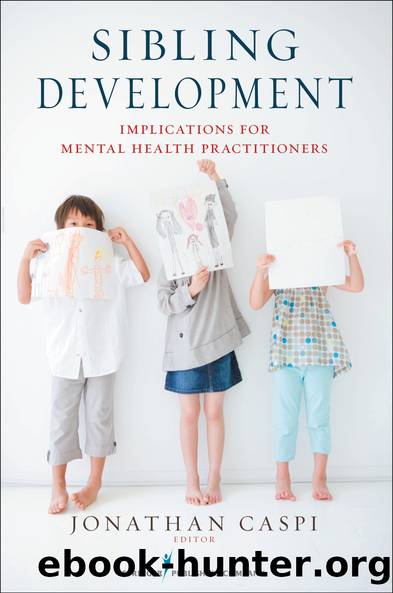Sibling Development by Jonathan Caspi

Author:Jonathan Caspi [Caspi, Jonathan]
Language: eng
Format: epub
Publisher: Springer Publishing Company
Published: 2010-12-11T00:00:00+00:00
10
Siblings in Families With Mental Illness
Ellen Lukens and Helle Thorning
Severe and persistent mental illnesses (SPMIs), particularly schizophrenia, bipolar disorders, and related diagnoses, are unpredictable illnesses with varying course and symptoms that can require intermittent psychiatric hospitalization over long periods (American Psychiatric Association [APA], 2000). Both parents and siblings of the person with SPMI witness the devastating effects of changes in personality and functioning in their relative and the struggle to manage both the needs of the person with illness and their own reactions and needs. The more overt symptoms of SPMI, particularly bizarre and unexpected behavior, paranoid ideation (sometimes projected onto family members), disturbance in thinking and communication, and the frequently observed behavior of nonadherence to treatment, are exceedingly disturbing to family members. The impact is multidimensional: affecting the family as a unit and each sibling and parent in unique and complex ways. The experience for family members is more challenging when the illness is accompanied by suicidal gestures, physical threats, coexisting substance abuse, or homelessness (Mueser & Jeste, 2008).
Relationships between brothers and sisters have been referred to as lifeâs most influential bond, lasting longer than ties to parents, spouses, or children (Bank & Kahn, 1997; Cicirelli, 1995). If the family or the parental unit experiences stress, the children are affected directly and indirectly and rely intensely on each other for support and affirmation (Bank & Kahn). The relationship between siblings serves as a major determinant of self-esteem (Cicirelli, 1995; Lamb & Sutton-Smith, 1982).
Available siblings play not only a significant role in the lives of those with SPMI, assuming responsibility for support, advocacy, and caregiving particularly when symptoms worsen and interfere with daily functioning, but also as a stable and constant force as professional services inevitably wax and wane. In spite of new attention on the potential for healing and recovery among persons with SPMI (Noiseux et al., 2009), the individual and his or her siblings and parents often contend with challenges associated with the illness over a lifetime. These responsibilities can interfere with the achievement of individual milestones and goals and throw the entire family off balance (Marsh, Dickens, Koeske, Yackovich, Williams, & Leichliter, 1993).
This chapter will look at mental illness and the sibling relationship. First, we will review the developmental literature in this area, which has mostly emphasized detrimental effects for the well sibling, although positive experiences have been identified as well. Developmental contextual considerations will then be considered. We then review the extant practice literature, which includes few empirically validated interventions. We include a case study to illustrate both developmental and interventional considerations, followed by a case critique. We conclude the chapter by offering future directions for research and practice.
Download
This site does not store any files on its server. We only index and link to content provided by other sites. Please contact the content providers to delete copyright contents if any and email us, we'll remove relevant links or contents immediately.
Should I Stay or Should I Go? by Ramani Durvasula(7669)
The Lost Art of Listening by Michael P. Nichols(7506)
The Rosie Project by Graeme Simsion(6415)
Beartown by Fredrik Backman(5755)
We Need to Talk by Celeste Headlee(5615)
Ego Is the Enemy by Ryan Holiday(5450)
Hunger by Roxane Gay(4928)
Suicide Notes by Michael Thomas Ford(4827)
I Love You But I Don't Trust You by Mira Kirshenbaum(3876)
Mummy Knew by Lisa James(3693)
Not a Diet Book by James Smith(3429)
Crazy Is My Superpower by A.J. Mendez Brooks(3401)
Toxic Parents by Susan Forward(3292)
Girl, Wash Your Face by Rachel Hollis(3282)
The Complete Idiot's Guide to Coping With Difficult People by Arlene Uhl(3149)
The Social Psychology of Inequality by Unknown(3031)
Name Book, The: Over 10,000 Names--Their Meanings, Origins, and Spiritual Significance by Astoria Dorothy(2987)
The Hard Questions by Susan Piver(2976)
The Gaslight Effect by Dr. Robin Stern(2794)
